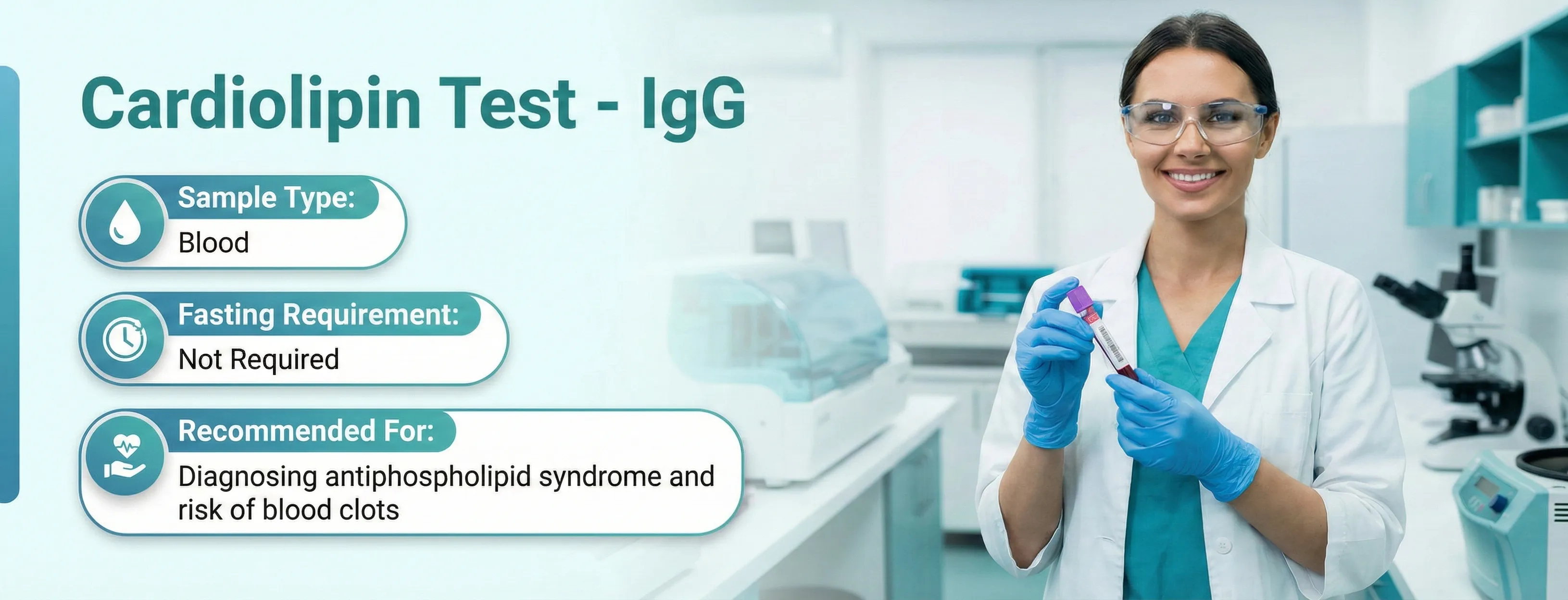20+ orders placed in your location
100% NABL & ISO Certified Lab • 100% Accurate Reports
Cardiolipin Test - IgG
Cardiolipin Antibodies IgG, Anticardiolipin, ACL Antibody IgG, Anticardiolipin Antibodies IgG
- SummaryThe Cardiolipin IgG Test detects IgG antibodies against cardiolipin, often used to evaluate unexplained blood clots, recurrent miscarriages, or autoimmune disorders like antiphospholipid syndrome(APS). It is a blood test suitable for all genders and age groups when clinically indicated. No fasting is required. Doctors may recommend this test for individuals showing signs of abnormal clotting or autoimmune activity.Read more
- Reports Within37 HrsView Sample Report100% NABL & ISO Certified Labs
- SampleBlood
- AgeAll Age Group
- GenderMale and Female
- FastingNot Required
PharmEasy Promises
Know More About The Test
A quick info on Cardiolipin Test - IgG
Overview
Cardiolipin is a component of the inner mitochondrial membrane, accounting for roughly 20% of total lipid content. It is present in the membranes of the majority of bacteria.
Cardiolipin (CL) is located in the inner mitochondrial membrane in mammalian cells. Its unusual structure is responsible for many of its actions.
Cardiolipin has more fatty acids than most other phospholipids. It is cone-shaped because of the fatty acids, which allow it to interact with a kind of protein.
Cardiolipin's structure can also vary, allowing it to adapt to diverse forms. It is required for the organization of specific mitochondrial structures such as cristae and contact sites. It regulates mitochondrial proteins such as electron transport complexes, carrier proteins, and phosphate kinases.
In the blood, this type of phospholipid aids in blood clotting. Blood clots can arise when antibodies attack cardiolipin. In this process, platelets that aid in blood clotting also undergo depletion, resulting in bleeding issues.
People with irregular blood coagulation, autoimmune illnesses including systemic lupus erythematosus (SLE), or frequent miscarriages have high levels of these antibodies.
Cardiolipin antibodies can be found in three different classes in the blood: IgG, IgM, and IgA. IgG and IgM are the two most typically tested antibodies. If these tests come out negative and clinical suspicions remain, IgA cardiolipin antibody testing may be requested.
The doctor will prescribe a Cardiolipin IgG test to those who frequently experience abnormal blood clotting or bleeding. For those who have experienced a lot of miscarriages, a Cardiolipin IgG test helps the doctor to figure out the cause. Cardiolipin antibodies are seen in the blood of persons with autoimmune illnesses like SLE, and this test could be used to aid in the diagnosis of this condition.
A Cardiolipin antibodies test examines your blood for a specific type of antibody. An antibody is a protein found in your blood that aids in the fight against illness. Cardiolipin antibody syndrome occurs when high levels of Cardiolipin antibodies are discovered in persons who have frequent abortions, deep vein thrombosis, or other problems.
Other names of cardiolipin IgG:
- Cardiolipin antibodies IgG
- Anticardiolipin
- ACL antibody IgG
- Anticardiolipin Antibodies IgG
What does the Cardiolipin IgG test detect/measure?
The presence of cardiolipin antibodies in the blood is detected by this test. Cardiolipin antibodies are autoantibodies produced by the immune system that wrongly target the body's cardiolipins, which are located in the cell membranes and platelets' outermost layer.
Who is the Cardiolipin IgG test prescribed for?
The Cardiolipin IgG test is not a routine test. It is advised by the doctor only when there is a suspicion of bleeding or clotting abnormalities. The doctor will advise for a Cardiolipin IgG test during these conditions:
- When a person experiences symptoms that are suggestive of a blood clot, a thrombotic episode.
- When thrombotic episodes reoccur, Cardiolipin antibody testing is usually requested. The signs and symptoms differ depending on where the clot is located.
- History of recurrent miscarriages in the second and third trimesters.
- If there are symptoms that suggest an autoimmune disease.
- In times of prolonged PTT (partial thromboplastin time), the blood coagulates (clots).
In the following symptoms, a cardiolipin IgG test is done.
A person with a clot in the deep vein (deep vein thrombosis, DVT) may experience symptoms such as:
- Swelling in the leg. Sometimes there's swelling in both legs.
- Pain in the leg.
- The pain often starts in the calf region.
- The cramping or sore sensation in the calf muscles.
- Red or discoloured skin on the leg.
- A warm feeling in the affected leg.
A person with pulmonary embolism may experience the following symptoms.
- Sudden shortness of breath
- Breathlessness
- Coughing
- Hemoptysis (blood in sputum)
- Lung-related chest pain
- Rapid heart rate
When a person shows symptoms of an autoimmune illness, a Cardiolipin IgG test may be conducted because of these symptoms:
- Extreme fatigue
- Brain fog
- Anxiety and depression
- Insomnia
- Fever
- Weight loss or weight gain
- Joint pain and muscle pain
- Skin issues
- Numbness and tingling
- Hair loss
- Headache
Sample Type
The Cardiolipin IgG test results are based on the analysis of blood samples. Usually, blood is extracted from a vein in the hand or elbow bend. The Cardiolipin IgG test procedure is not painful.
A simple blood sample is sufficient for Cardiolipin IgG detection. The collection of the blood sample can be at a hospital or laboratory. For more specific instructions, consult the concerned doctor. The evaluation of Cardiolipin IgG test procedures is done in laboratories with specialized equipment.
Cardiolipin IgG test preparation
There is no need to prepare for the Cardiolipin IgG test, as it's a simple blood test. The doctor may ask to fast for 9-12 hours before the sample collection if the doctor finds a need for other tests along with Cardiolipin IgG.
A tourniquet (elastic) band is tightened around the upper arm to obtain a blood sample. This Cardiolipin IgG test doesn't possess any risk.
Cardiolipin IgG inclusions: What are the parameters included?
The Cardiolipin IgG test includes only one parameter. The Cardiolipin IgG tests detect antibodies produced by the immune system. This test detects the presence of cardiolipin antibodies in the blood.
Cardiolipin antibodies are immune system autoantibodies that wrongly attack the body's cardiolipins when present in abnormally high levels.
How frequently should you take the Cardiolipin IgG test?
If Cardiolipin antibodies are found in an initial test, the test is routinely repeated 12 weeks later to see if they are permanent or only present for a short time.
Moderate to high levels of cardiolipin antibodies that persist when tested 12 weeks later indicate that the antibody is likely still present, which could be linked to an increased risk of excessive clotting.
A person with a known autoimmune disorder may be retested after 3 months if they have a negative Cardiolipin IgG test as these antibodies can develop at any time. If cardiolipin antibodies are not found in a person with an autoimmune condition such as lupus, repeat testing every year to monitor their development may be requested.
Risk Assessment
Deep vein thrombosis, Pulmonary embolism, Systemic lupus erythematosus, Diabetes, Cardiovascular diseases, Abortion
Ranges
Depending on your age, gender, medical history, test technique, and other factors, your test results may differ. It's possible that the results of your tests don't suggest a problem. Always inquire about the consequences of your test results with your doctor.
- The normal range of cardiolipin IgG is below < 23 GPL (Immunoglobulin G phospholipid units).
- Weak positive: 15-40 U/ml
- Positive: >40U/ml
Test Result Interpretation
Cardiolipin IgG test results are simple to comprehend. The test results have only one parameter Which is the level of ACL IgG antibody level
A negative test means
- Cardiolipin antibodies are not present in excess levels in the blood.
A positive test means there could be
- The presence of excess or abnormally high levels of cardiolipin antibodies in the blood.
- A recent history of infection.
- History of drug overuse.
A positive result indicates as previously stated, cardiolipin antibodies can suggest a variety of disorders, including:
- Syphilis
- Antiphospholipid syndrome (APS) Systemic lupus erythematosus (SLE)
- Atherosclerosis
- Myocardial Ischemia
- Diabetic Cardiomyopathy
- Barth Syndrome
- Repeated miscarriages
- Cardiolipin antibody syndrome
- Antiphospholipid syndrome
Anticardiolipin IgG can also be seen in healthy people. Patients who test Cardiolipin IgG positive should be retested six to eight weeks after the initial test due to the transitory nature of antibodies in some of these cases.
Low levels of Cardiolipin IgG may be present in:
- HIV
- Certain types of cancer
- Infections
- The elderly
- In people on drugs such as phenothiazines and procainamide.
Was This Test Information Helpful?
Please rate your experience
References
People Also Ask
What does a positive cardiolipin test mean?
What does an Anticardiolipin blood test for?
What does a negative cardiolipin test mean?
What is a normal Anticardiolipin level?
Have any doubts? Ask us.
Ask us anything about the Cardiolipin Test - IgG to understand it better
We provide trusted, expert-curated health content to support better awareness,prevention, and care.
Backed by experienced doctors, medical experts, and strict editorial standards.


